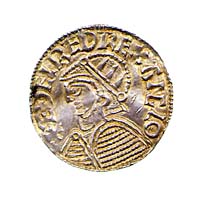April 23, 1016: Death of King Æthelred the Unready
 |
| King Æthelred, facing left, wearing helmet and battle armour. Legend: + ÆÐELRED REX ANGLO |
So why was Æthelred called "the Unready"? Well, first of all, we're not sure that he was, by his contemporaries. The earliest clear occurrence of the nickname is in the early thirteenth century, in the form "Unrad". It was originally a play on Æthelred's name, the elements of which mean "noble (æthel) counsel (ræd)" -- the punning suggestion was that "negligible or evil (un-) counsel (ræd)" was closer to the mark. Later, when the meaning of "Unrad" was no longer clear, it was corrupted to "Unready". While the Anglo-Saxons did have a weakness for this kind of wordplay, it is surprising that the nickname is not mentioned by the twelfth century historians who tend to give us that sort of detail. So the joke may have been started by a wit in the late twelfth century rather than by a contemporary.
Whenever the nickname started, the unfortunate fact for Æthelred is that he came to the throne in 978, and the Viking attacks started up again (after a few decades of peace) in 980. Æthelred ruled the country for almost 38 years, but by the end of 1016, the year of his death, England had been conquered by the Vikings, and its new king was Cnut the Dane.
Review the history, 978-1016